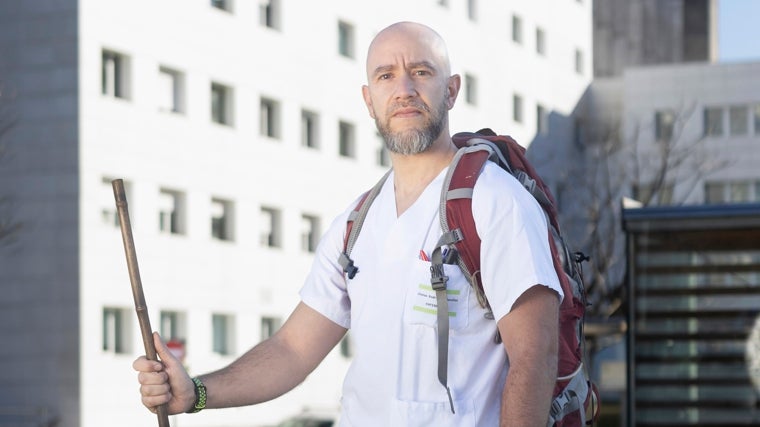A contract of one month, another of fifteen days, several months without any offer and another fortnight of work. And start again. Antonio Jesús García, a nurse who is currently 27 years old, found himself in this situation when, after finishing his degree and two years of specialization in pediatrics, he landed on the job market in 2022. He did so in Andalusia, as he is a native of Puente Genil, in Córdoba. But in October 2023, tired of chaining short contracts that generally did not allow him to develop his specialty (most were for general care), he packed his bags and went to Galicia. In Orense, a few days after arriving, he obtained a position as a pediatric nurse in a public hospital for the next three years and with the possibility of renewal. “All that accumulation ends up wearing you down both physically and mentally,” he now tells ABC. “So I found out in which community pediatrics worked best and I moved here to Galicia and I’ve been here for a year or so in the same position,” he says.
On this adventure he was accompanied by his partner, also a nursing professional, who did not hesitate to follow him in search of that job stability that they have found without having to leave Spain. At the moment they are not considering moving again and if they did it would be only to return home, since Andalusia is where they have their family and friends, although at the moment it is not part of their immediate plans. «Here we are happy, we have stability. And even though you are within the same country, going from one place to another is quite overwhelming and represents a brutal change in your life,” he explains.
This “brutal change” that this nurse speaks of is suffered every year by thousands of his colleagues. According to the report ‘Current situation and estimation of needs for nurses in Spain’, presented last week by the Ministry of Health, in 2024 there were 12,426 signed by nurses that involved transfers to other communities. The General Nursing Council (CGE) puts a figure on how many healthcare providers this situation affected (since a person may have signed several contracts at different times). Thus, according to their data, there were 6,646 nurses who changed autonomy or, in some cases, province.
The autonomous communities that lost the most nurses, according to Health data, were Andalusia and Castilla-La Mancha while, in contrast, the regions that received the most professionals were Catalonia, Navarra and Madrid. This mobility, points out Florentino Pérez Raya, president of the CGE, is due to the “job insecurity” experienced by the profession, with “temporary contracts and poor working conditions.” This temporality, continues the president of the nurses, does not drop below 30%, “far from the 8% set as a goal by the Government.”
Mobility balance
geographic between the CCs. AA.
Fountain: Ministry of Health /ABC

Balance of geographical mobility between the CCs. AA.
Fountain: Ministry of Health /ABC
“When a nurse – or male nurse – decides to leave her place of birth or residence and move hundreds of kilometers away, she does so driven by a better salary or the creation of positions in the health system of that region, including, of course, competitive examinations” , continues Pérez Raya. It also highlights other factors among the causes of these transfers, such as the shortage of professionals that leads to an overload of care, or the recognition or not of the specialty. «Most professionals do not want to go far from home, but living with contracts, often for days and even hours, is very hard. Nurses see how their personal lives are affected and it is almost impossible for them to reconcile. Giving up a contract, which is sometimes offered overnight, entails a penalty that takes them directly to the bottom of the job market. “How can they not look for another place, whether outside their province or in another country?” launches the president of the CGE.
Two, three or four month contracts
The stability that Antonio Jesús García found after moving to Galicia caught the attention of one of the colleagues he met during his training as a specialist in Seville, Ana Fernández Bazán, who, as had happened to him, had been chaining temporary contracts for two years. two, three or at most four months. “He told me how things were going for him and told me that I could try Galicia too,” he says. So he started to think about it. Seeing how colleagues with more experience than her received offers of contracts of one or two months also helped her take the step. «I realized that there was no future for me in my community, that I would not have a stable job, so I called to ask the hospital where Antonio worked, which had vacancies with stable three-year contracts. In less than 24 hours they told me that they had a vacancy on the pediatric inpatient ward, so I packed my bags and came. In Andalusia they were not going to offer me that even in my wildest dreams.

Alfonso Rodríguez, a native of Ferrol, has managed to work again in his city. But before that he passed through Mallorca, Tenerife and Seville for professional reasons.
miguel muñiz
In the case of this nurse, who is now 28 years old, the fact of being able to work in her specialty, pediatrics, also weighed heavily, since, according to the Health report, regions such as Andalusia, Ceuta, Melilla and the Basque Country do not have that category established. professional. «I knew perfectly well that I wanted to work on this, it is what I like. And not doing so would mean throwing away all the work and sacrifice I made to be a specialist,” he says.
Alfonso Rodríguez also knows what it is like to leave his home for work, although over time he has returned to his native Ferrol. But at 38 years old and until reaching this point, where he has a stable job that allows him to reconcile, he has gone through several places: first he landed in Mallorca, where he stayed for several years; later, in Tenerife. From there he returned to the Balearic Islands, also stopping in Seville until he finally returned to his Galician city. When he started, he says, it was difficult to have a place in his community, and that was the main reason for his departure. Although he admits that salary is important, he believes that other things take precedence for him. «I would look at other types of conditions, such as the types of shifts or the ratios and workload. And also the stability of the contracts, of course,” he says.

Since she couldn’t find work in Seville, Alba Castro packed her bags and ended up in Pamplona, where she now combines her public and private work.
eduardo sanz
Salaries between regions can vary by more than a thousand euros per month, as confirmed by the Health report. Thus, while the minimum monthly salary of a generalist nurse in Primary Care is 1.1647 euros in Cantabria or 1,806 in Castilla-La Mancha, professionals charge 2,898 in the Canary Islands or 2,917 in Navarra for the same category. This last community is where Alba Castro Romero, a 23-year-old from Seville, went, who currently combines her part-time job as a public health nurse with that of a private center in Pamplona. At first she considered moving to the Basque Country, as she claims that it is where nurses from the south of Spain go most, but she heard of another case in Navarra of a person who was doing well, so she decided to try her luck (and found it). «Here it is very easy to get work, contracts are constantly coming out. And it is also well paid,” he explains.
Also from Extremadura
The decision to leave home, however, was “hard”, leaving his family and friends, so if he had to move again he would only do so to return to Seville, although at the moment he is not going to do so. Like her, she says, in the Navarrese community there are many nurses who come from Andalusia and also from Extremadura. But Castilla-La Mancha does not manage to retain its professionals either. This is the case of María José Soriano, 22 years old and from Albacete, who shortly after graduating and after finishing her first contracts, moved, along with her cousin and two other friends, all nurses, to Santiago de Compostela, where right now she still They chain short contracts but with the certainty that when one ends the next will arrive. “Our plan is to stay here for a season, without a deadline, and gain experience and score points,” he says.
Health recently conducted a survey of more than 55,000 nurses that leaves a worrying figure: 39.4% are considering leaving the profession in the coming years. Some of those interviewed for this report claim to be among that percentage, others do not, but they all agree on one thing: the working conditions and the instability of jobs justify this thought. “It is a very demanding profession on a psychological level and if you add the conditions of professional abuse, I understand why they are considering it,” concludes Alfonso Rodríguez.
#Exodus #nurses #autonomies #wildest #dreams #offer #community


